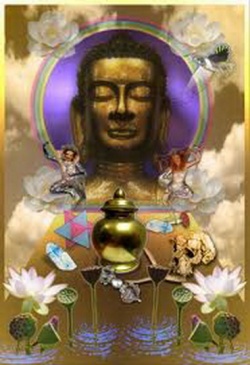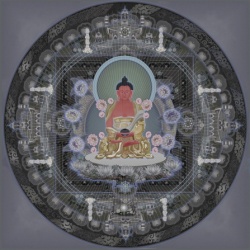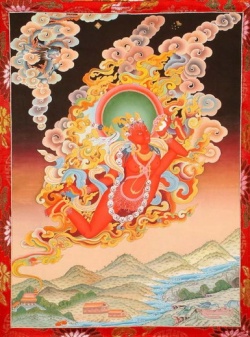Angulimala (Bodhisattva)
Having realised the cause of human suffering and the remedy thereof, Lord Buddha wandered from place to place to enlighten the people. His teachings concern the forces that cause bondage and the means by which salvation can be achieved. He was received with respect wherever he went. Prasenajit, the King of Kosala, who ruled from his capital, Shravasti, was a great
admirer of Lord Buddha, although he was not converted to Buddhism. In the forest on the ouskirts of Shravasti, lived Angulimala, the dreaded highway robber who plundered and killed travelling traders. Fearing him, people eventually gave up travelling by the road that passed through his haunts. Though everybody shunned Angulimala, Buddha chose to cross his path. Then took place
the historic meeting of the saint and the sinner. In that encounter between the forces of non violence and violence, the former prevailed. Angulimala became a disciple of Lord Buddha. This Amar Chitra Katha is an adaptation of the story of Angulimala from the Buddhist text, Paramatthadipani of Dhammapala.
… we can be especially sympathetic and affectionate with foolish people, particularly with someone who becomes a sworn enemy and persecutes us with abusive language. That very abuse conveys the Buddha’s boundless loving-kindness. It is a compassionate device to liberate us entirely from the mean-spirited delusions we have built up with our wrongful conduct from the beginningless past.
Speaking only for myself, when someone directs abusive language at me, my unconsidered reactions are outrage and a sense of moral superiority. These are my mean spirited delusions. After some reflection I may come to the realization that I too have on many occasions acted in the same way toward others and, if I am being exceptionally insightful, when I am
the perpetrator of abuse I tend to excuse my misconduct. On the few occasions when I also consider the effect of my actions on others I might entertain the emotion of remorse or even try to make amends for what I have done. But when I am the receiver of such misconduct my state of mind is not as forgiving as when I am dishing out the abuse.
This reflection leads me to one of my favorite stories from the Pali Canon — Angulimala. He was someone whose behavior was not just difficult for others; he was downright homicidal. He was such an effective highwayman and bandit that when
people stopped going out on the roads in order to avoid him, he just went to their villages and towns and murdered them there. The Sutta describes him as being:
… brutal, bloody-handed, devoted to killing & slaying, showing no mercy to living beings. He turned villages into non-villages, towns into non-towns, settled countryside into unsettled countryside.
After he encounterd the Buddha he gave up his violent life, became a monk and later an arahat. A completely changed man, one day he went into a village for his daily begging round.
Now at that time a clod thrown by one person hit Ven. Angulimala on the body, a stone thrown by another person hit him on the body, and a potsherd thrown by still another person hit him on the body. So Ven. Angulimala — his head broken open and
dripping with blood, his bowl broken, and his outer robe ripped to shreds — went to the Blessed One. The Blessed One saw him coming from afar and on seeing him said to him: “Bear with it, brahman! Bear with it! The fruit of the kamma that would have burned you in hell for many years, many hundreds of years, many thousands of years, you are now experiencing in the here-&-now!”
For the vast majority of us, when we experience the trial of dealing with difficult people we are presented with the opportunity to recognize our own behavior. We can then transform the experience of being abused by observing the greater truth rather than indulge easy sentiments of superiority, outrage, anger and retribution which lead nowhere. Bear with it!
Once upon a time, a long time ago, during the time of the Buddha, in fact, there was a small kingdom with people who were happy and well off. They farmed, and traded, and traveled with ease.
Unfortunately, a plague came to their kingdom in the form of a bandit. They called this bandit Angulimala. Angulimala had sworn he would kill 1,000 people. He kept count by stringing one finger on his necklace. People fled the country to the protection of the city. One day, the Buddha came walking to this kingdom, and he heard of the feared bandit. He decided to investigate.
When Angulimala saw this lone monk walking toward him, he laughed with glee. Angulimala twirls sword and laughs.
Angulimala ran toward the Buddha, but a funny thing happened. He was never able to get any closer to the monk. No matter how fast he ran, he couldn't catch up to the Buddha. He was very frustrated. Finally Angulimala stopped, and he said,
Angulimala: Stop monk! Why can't I get close to you?
And the Buddha said,
Buddha: I have stopped. You should stop too.
Angulimala: What does THAT mean?
Buddha: I have stopped living in hope and fear, and I have stopped hating and hurting others. If you want to be like me, you should stop too.
Narrator: And the Buddha looked at Angulimala with such love and kindness that Angulimala DID want to be like the Buddha. He wished with all his heart that he had never hurt anyone, and he threw down his sword and shield and asked the Buddha to be his teacher.
Angulimala traded his finger necklace for a necklace of prayer beads, [flip necklace] and learned to meditate with the Buddha. The Buddha convinced the king to pardon him, and the new monk spent many hours in the forest meditating and he became calm and peaceful.
Now Angulimala knew he could never make up for all the people he had killed. Often when he walked past a crowd, he was elbowed, or tripped with a shovel or broom handle, or bumped so that he fell in a ditch.
villagers trip, bump, jab, the monk Angulimala.
The Buddha helped him to understand this was an effect of his past life as a bandit, this was his karma. Angulimala couldn't blame them. He would pick himself up, and bow, and offer to mend the broken broom handle.
You'll remember in his old life, Angulimala took delight in fear and in killing people. Now he felt remorse, and he loved life. He felt if only he could help life come to be, he could make up for his past in a small way.
Because of his past life, Angulimala knew well the ways of wounds and blood, and because he wanted to help people live, he took on the specialty, you could say, of helping mothers give birth safely. Because he took great care to pay
attention to their needs, mothers in his care gave birth to healthy babies. His knowledge that had once helped him be a very bad man now supported his very loving actions.
Angulimala visits mothers with babies. One or two 'give birth.'
In time, less and less people tried to hit or trip the kind and loving monk. Eventually, the gratitude among families for his help in supporting life overwhelmed the old fear and distrust.



